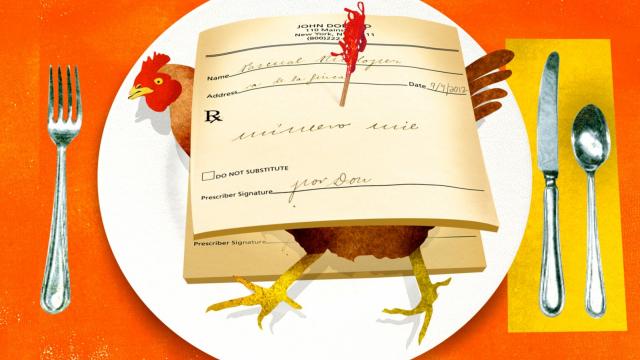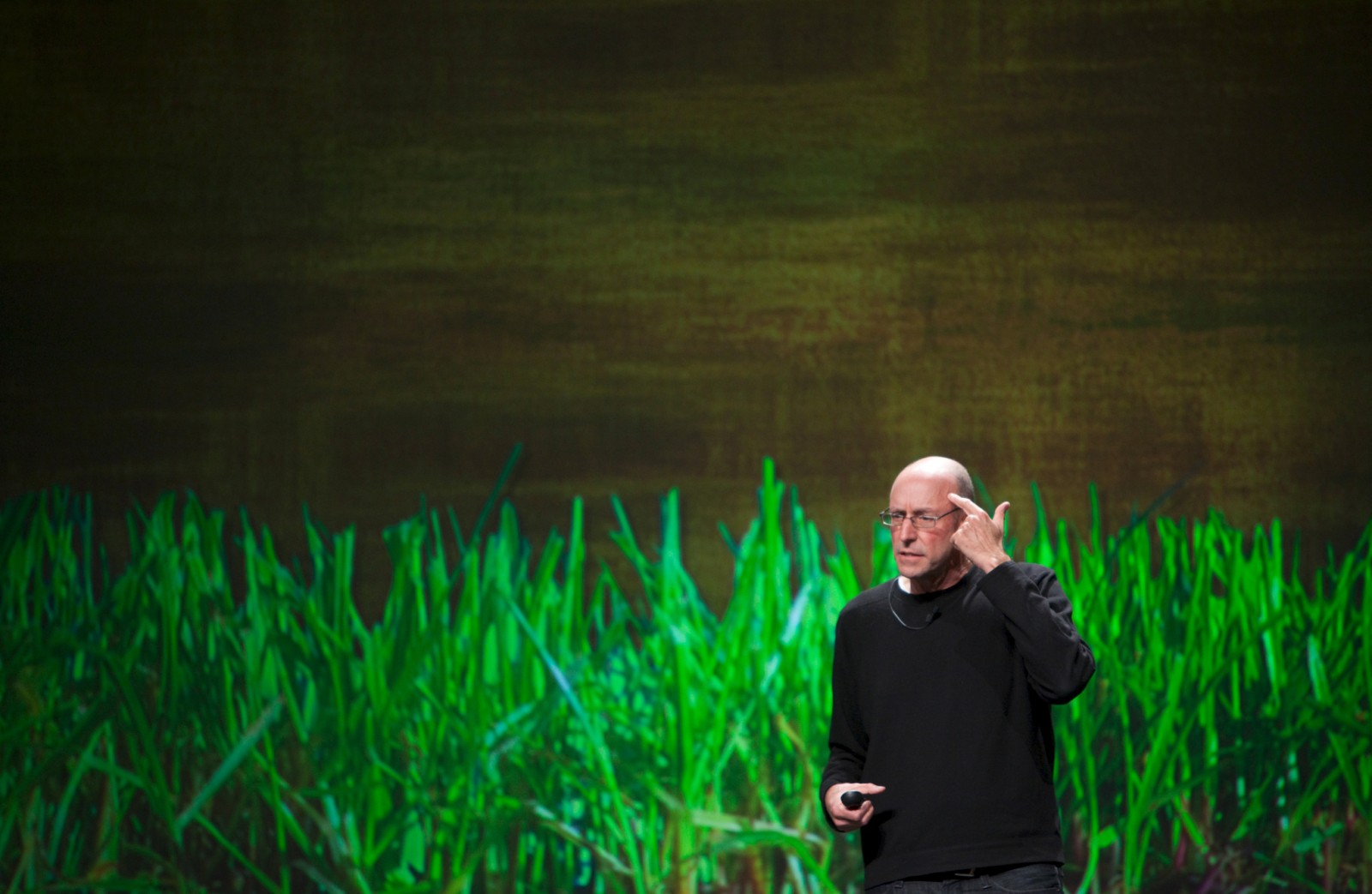
In 2008, food writer Michael Pollan published an open letter to President-Elect Barack Obama. He began with a warning. "It may surprise you to learn that among the issues that will occupy much of your time in the coming years is one you barely mentioned during the campaign: food."
Take climate change. "After cars," Pollan wrote, "the food system uses more fossil fuel than any other sector of the economy." As for health-care reform, the chronic diseases forcing spending ever upward are rooted in the way Americans eat. "You cannot expect to reform the health care system, much less expand coverage, without confronting the public-health catastrophe that is the modern American diet."
Five years later, Pollan is disappointed that Obama didn’t listen. "There’s been a timidity when it comes to looking at the food system," he says.
Consider the Environmental Protection Agency’s recent announcement that it would begin regulating emissions of methane, a powerful greenhouse gas. "The agricultural sector generates more methane than any other sector," Pollan says. "But for reasons I can’t fathom, when they announced the new rules governing methane in the energy sector, they called for voluntary measures in the agricultural sector."
In a wide-ranging interview, Pollan, the author of the recent "Cooked: a Natural History of Transformation," explained what studying the food system teaches you about capitalism, why he’s more excited about meat made from vegetables than meat made from clones, and whether it’s time to add anything to his famous triplet: "Eat food. Not too much. Mostly plants."
The White House is Afraid of Big Ag
Pollan is clearly puzzled by Washington’s fear of food producers. "The energy sector is a powerful lobby," he says, "but the President seems willing to go after them. But not agriculture."
It’s not just the methane regulations. Pollan brings up the use of antibiotics in livestock. According to some estimates, 80 percent of the antibiotics used in the United States are used in farms. Researchers worry that this is helping to create a new class of antibiotic-resistant "superbugs."
In December, the Food and Drug Administration decided to crack down on antibiotic use on farms. "But the choice was for voluntary guidelines," says Pollan. "I’m not exactly sure why that’s the case."
He does have a theory, though. "People’s eating choices are more fundamental and closely tied to their identity than their driving decisions or how they choose to heat their house or anything else," Pollan says. "If you challenge my right to have a cheeseburger, that’s getting a little intimate." And so politicians steer clear of anything that sounds critical of the American plate.
"It’s curious that we’re open to social engineering when it’s being done by corporations," Pollan muses. "You’re socially engineered every time you walk through the cereal aisle in the supermarket. The healthy stuff is down at your feet and the stuff with the most sugar and chocolate is at your eye level — or your child’s eye level. That doesn’t seem to bother us. But as soon as it’s done by elected officials on our behalf, it’s anathema."
Forget Meat Made in Labs. Look at Meat Made From Peas.
A theme running through much of Pollan’s work is that modern meat production is almost unthinkably cruel. So I wondered whether he was enthused by recent glimpses into a possible future for meat production: one that clones animal parts and grows them in labs for food rather than raising animals and slaughtering them in industrial production facilities.
"There are two kinds of lab meat," he replies. "There’s the high-tech, Sergey Brin-cloned animal protein, which I think is far away and I’m in no rush to see it arrive. But then there are a lot of interesting efforts to make much better mock meats out of vegetable matter." Pollan brought up Hampton Creek’s Just Mayo, a mayonnaise substitute made from peas.
Peas?
"It’s completely persuasive as mayo," Pollan insists, "and it doesn’t rely on egg production, which is one of the most brutal aspects of animal agriculture."
There’s a broader point here: the lab-grown meat is trying to compete with, well, meat. Scientists are trying to grow a steak that’s better than the one a cow grows. That’s incredibly difficult. What’s much easier — and much further along — is replacing the animal products that don’t end up as meat.
"A lot of cheese goes into things like frozen pizza where you’re really just getting a gooey white substance," Pollan says. "A lot of eggs go into things like mayo where you’re really not seeing the egg. If you could replace that kind of production with something that doesn’t require actual animals you could make some huge strides in animal production."
The next step up the chain might be replacing the meat in things like fast food. In 2011, Taco Bell was sued for using beef that was less than 65 percent, well, beef — which meant it didn’t meet USDA’s definition for beef. The company responded by arguing that the meat they were using was actually 88 percent beef (their page answering frequently asked questions about their meat is, perhaps accidentally, hilarious).
What no one on either side of the debate ever argued was that their beef was 100 percent beef. Perhaps, in the future, the meat in their tacos won’t be made from meat at all. Amidst the sauce and the fillings and the tortilla and all the rest of it, would any of us really know the difference?
Developing humane, environmentally friendly replacements for the eggs in processed mayonnaise and the cheese in frozen pizza and the (sorta, kinda) meat in Doritos Tacos Locos is a hell of a lot easier than cloning cow flesh so it’s a persuasive substitute for steak.
So why does cloned cow get all the press? Pollan has a theory.
"You Learn an Enormous Amount About Capitalism Studying Food"
Pollan has an interesting take on genetically modified foods. The promises behind GM foods — much less need for pesticides, much higher yields — haven’t come true save in isolated cases. But they have driven a massive change in food production. "What genetic modification of crops has given us is dramatic consolidation," he says. "Monsanto has used the huge profits from Roundup Ready seeds to buy up a sizable portion of the seed industry."
This is something, Pollan says, that you see again and again when you look at which food innovations get attention — and funding. A close look often shows that the problem being solved wasn’t a problem in how we grow food, but in how companies grow profits.
There’s a "key fact" you need to know to understand the food industry, Pollan says: Wall Street wants these companies to grow by at least 5 percent each year. But America’s population only grows by about 1 percent each year. That is — or at least was — a problem.
"For a long time people in the industry thought it was impossible to get people to eat more," Pollan says. "They called it ‘the fixed stomach’ and they lamented that, unlike in the shoe business where you could get people to keep buying more kinds of shoes, you couldn’t get people to eat more. Well, they’re to be congratulated. They solved that problem. Capitalism is very powerful. It solves problems. But it solves its own problems, not always our problems."
Take Golden Rice, Pollan says. That’s a genetically modified rice meant to address vitamin A deficiencies in the developing word. "That’ll be terrific if they ever get it into a field," Pollan says. "But it’s important to ask whether you spend $300 million on Gold or encourage them to plant squash or greens in pots around their houses or around the edges of t fields."
"Sometimes there’s a really boring way to achieve the same thing. But we tend to love solutions that have intellectual property attached to them that someone could profit from."
Can Industrial Food Production Survive Climate Change?
If you graph projected food production against projected global population, you get something very, very scary. It’s clear, if current trends continue, that we’re going to have more people than we can actually feed.
In recent centuries, however, current trends haven’t been accurate guides to the future of food production. There have been horrible famines, to be sure, but globally speaking, human beings have figured out how to produce enough food to feed everyone. The question I asked Pollan was whether we would manage to feed everyone in a humane and environmentally sustainable way.
"The question of whether you can feed the world sustainably needs to be flipped around," he replies. "The real question is whether you can feed it industrially. What we’re learning about climate change is raising real questions about how long that agricultural model can survive."
He continues, "The power of industrial agriculture comes from this paradigm: you start with a very productive seed that under ideal circumstances can produce higher yields than those species ever could before. It’s really impressive. But for those seeds to do their thing and realize their full potential they need lots of water. They need lots of fertilizer. And they need to be defended against pests really vigilantly. Another way of saying that is: you need to protect the environment in which they grow, which farmers have been able to do. But that system depends on consistency. If all we can count on now is that the climate will be variable, that system becomes very brittle."
But won’t companies just invent new seeds that are better able to manage more volatile climates?
"Monsanto is working on a lot of drought-tolerant crops," Pollan agrees. "That sounds like a good idea. You’re engineering a crop that puts more resources into a deeper root structure — it’s wetter the deeper you go — and these crops will work probably when you have a reliable drought situation. But it’s only going to do well in a drought. It will underperform in years without droughts. So it’s a very brittle solution to the problem."
"Compare that to a system where you’re emphasizing soil health. When you look at organic and industrial yields in a normal year, industrial yields are about 20 percent higher. But in drought years organic crops outperform soil because healthy soil is an incredible buffer against climate problems. So sustainable agriculture may offer certain advantages that are very well tailored to practicing agriculture in an unstable climate. The question may really be not whether sustainable agriculture can feed the world but can anything except sustainable agriculture feed the world."
Eat Food. Not Too Much. Mostly Plants. And Make Some of Those Vegetables Fermented?
In 2007, Pollan wrote: "Eat food. Not too much. Mostly plants." The triplet became instantly famous — which left Pollan a bit disturbed.
"I don’t take it as a genius breakthrough," he says. "The point was commonsense. The fact that it was even noteworthy is what’s noteworthy about it. It’s a measure of how perplexed we’ve become about food as a result of what the food industry has done. You have to be pretty lost for that to come as news." In his most recent book Cooked, though, Pollan says he’s a convert to the benefits of fermented foods like kimchi or pickles, and tries to eat at least a few of them a day. So I asked whether it wasn’t time to update the advice.
"I don’t think I would have added ‘and make some of those vegetables fermented.’" Pollan laughs. "I’m a writer. That sounds horrible!"
3 WAYS TO SHOW YOUR SUPPORT
- Log in to post comments














